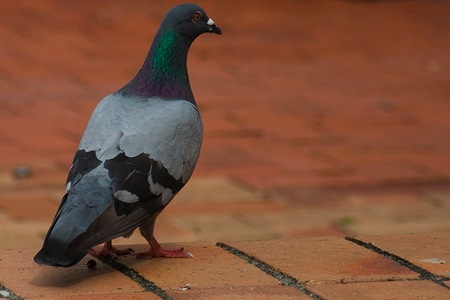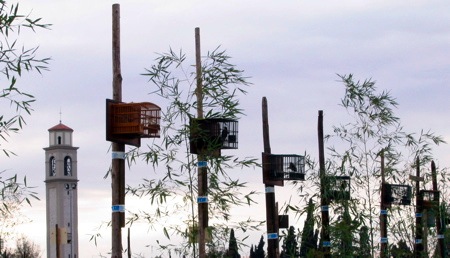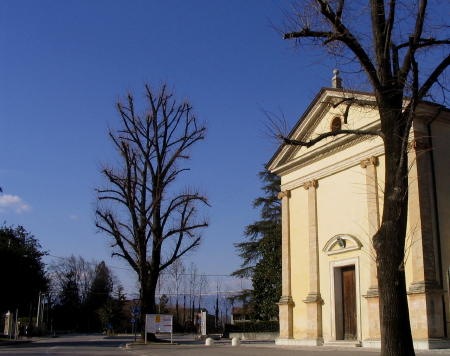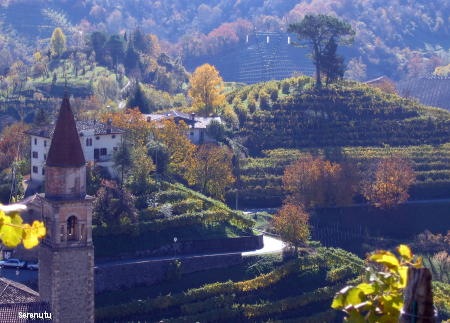
picture courtesy of Ritalin on Flickr
Eduardo closed his eyes, pushing together his abundant brows. His large frame filled the tiny chair as he leaned his elbows on the desk and gently tapped his finger tips together.
“Ok. Tell me everything. Exactly how did it happen?”
“Well, I pulled up to the pump, let’s say #4, stuck the nozzle in the tank and then went in to pay. You know in California you must pay first.”
“Go on.”
“The man inside at the counter told me that pump #4 was broken and that I should switch to another. After peering out at the available pumps, I told him I would move to #6.”
“And then?”
“I paid.”
“Ok, ok. And then?”
“I went out to my car, got in and pulled right up to pump #6. I was kind of in a hurry.”
“Without removing the nozzle, right?” Eduardo was excited.
“Right. I went out to fill the tank and it was just hanging there, like a dismembered arm. I had to remove it and take it into the man behind the counter. He was not happy.”
“Now, tell me. Where exactly did it snap? I need to know if the shut-off valve in the break away system worked properly and if it was one of ours...”
Eduardo is the sales manager of a major developer and supplier of gas station equipment and specifically, a system of hoses and nozzles designed to prevent gasoline spills, accidents and let’s face it, disasters like me. He was delighted to know I had truly put his company’s designs to the test. I did not tell him that I have actually done it twice. Who could have imagined I would one day find myself sitting in a class room in Treviso, Italy teaching English to a man who is responsible for preventing me from blowing up much of North Berkeley? I thanked him for all of us.
~~~
Earlier that morning I had talked to Alex about my weekend. Luciano and I had gone to a dog show in the small town of Godega. As we entered the fair grounds I noticed rows of birds in small cages which had been nailed to tall poles. The birds perched in tiny cages in against that cold grey sky, were singing as though their hearts would break, yet were too high for any visitor to see. While I was pondering this, Luciano was muttering, “It is a little strange, the people who would be interested in these birds are not here, but out in the field.”
“What do you mean?”
“These birds are being shown for their calling ability. Hunters use them.”
Then it was clear. The birds, dowdy and plain, were of interest for their ability to convince traveling wild birds that it was safe to land. “Come on down,” they entreat, “Join us, it is not dangerous.” How ingenious and diabolical. Leave it to the Italians to devise a simple, inexpensive solution--- a thousand years ago.
As I recounted the story and my admiration of such a clever system to Alex, he listened closely then sat for a moment looking at me, obviously disgusted. In his newly acquired English he expressed his contempt.
“You know Serena, Americans could learn a few things from Italy. America is so advanced, there is so much technology, yet you have never seen birds used by hunters? What do they use to attract birds?”
“I don’t know…maybe the same thing. I have never seen it.”
“Maybe, maybe. Italy has many good ideas. You need to look.”
~~~
Later I had another bird discussion. Mr. B is an elegant older man whose company is housed in a former girls’ school built in 1876, a graceful brick building with the date embedded in its mosaic floor. It seems he had a problem with pidgeons on the roof of his Treviso house. He also had a few ideas:
“My first plan was to get a few friends of mine who are hunters to bring their rifles to town and stand across the street and pick them off. But I was informed that the police might not approve.”
The image in my head of this event was too wonderful. This refined gentleman, a prominent citizen of this town, a member in good standing of the Treviso Rotary Club standing on the curb, thumb in his vest pockets directing the hunters as they blast away at the roof of his townhouse in the medieval center of town.
What a pity he has now resorted to discussing his problem with the Rat Man of Treviso, a real character introduced in the book “City of Fallen Angels” by John Berendt and an acquaintance of Mr. B’s, who I am sure will professionally and efficiently dispatch the birds, but with much less flair. Mr B smiles sadly and shakes his head at this silly modern reluctance to deal with such issues in ways that had always worked before.
Italy is a country where even my nine year old student has a cell phone, yet the department store sent me home with a set of sheets so I could check the color, without asking me to pay for them first. It is easier that way, they said. When I enter a bar for a coffee, I am politely greeted by everyone, customers and owners alike and the coffee is made the same way it was made for Napoleon. Yet I can drop a coin into the machine at the train station and get a perfect cappuccino in an instant, right down to the tiny spoon clutched in the creamy foam. North Berkeley is saved from destruction by Italian technology while gasoline is carried home in a bucket during the last strike.
And songbirds are used to entice victims for the hunters to blast out of the sky, while modern inner-city niceties foil Mr B’s ingenious plans for the medieval center of town.


Under a grey heavy sky I strolled down Strada Nuova to see this year’s baby goats. Luciano had told me that they were there this morning. But there were no babies to be seen, just the cranky Billy goat chained to a tree and a rag tag collection of ducks and chickens wandering the enclosure like so many inmates in an insane asylum. I kicked at a rock as I walked back up the lane, feeling a little down on this dreary spring day.
I know it is spring since the tree across the street is blossoming, almost as I write, and the neighbors at the end of the lane have planted the most orderly spring garden ever put in the ground. As a sure sign of spring, the election posters are going up all over town for the upcoming election. There are 147 different parties. 147. Nothing spells a change in season like one hundred and forty-seven little political symbols on a metal billboard.
Still I didn’t feel it.
A bird sings in a naked tree above me, blithely ignorant of the folly of politics. Its song is lilting and complicated. When the tune is finished, he starts over again as he knows no other. I was reminded of the first LP I ever owned, a recording of bird calls and nothing else; eerie calls of loons in the dark or the disembodied chattering of wrens titled, I think, Evenings at Loon Lake. While my brothers played air guitar to Led Zeppelin, I listened to the calls of the Yellow-Throated Warbler. From this limited record selection I had for many years been able to identify birds before I even saw them, from their songs alone. Now, I drew a blank as the plain, unidentified bird sang away, rejoicing in the hushed arrival of spring.
I was not ready to celebrate.
I know it is spring because of the refrigerator-sized Easter egg that sits outside the little chocolate factory down the road. By early morning the miniature parking lot is filled with the cars of the chocolate makers, leaving only two or three spaces free for customers. The factory is next to a small river and the little bump of a bridge that crosses it becomes treacherous this time of year. I have learned to expect chocolate-jams as customers line up in the afternoons and evenings to load up on what is produced each morning. Despite the leaden sky, there is a carnival mood.
I am not sure.
This morning as we had our Saturday breakfast at our favorite bar, I read the headlines:
Baseball at School, Two Babies in the Hospital
Parents protest saying “Too Dangerous”
It seems that the school district of Castelfranco had introduced baseball to the sports program in order to give the babies (ten year olds) an opportunity to practice an unfamiliar sport. In the space of two weeks, two children had ended up in the hospital. I showed the story to Luciano.
“Wow, someone has got an arm. Sign him up!”
“No, Ciano. I think they have been hitting each other with the bat.”
“What? Let me see.”
All that was needed was a moment of distraction and a little confusion and the bat claimed a second victim. “PE class has become a dangerous nightmare,” parents complained.
“Those kids are swinging at each other,” I told Luciano. “They are whacking one another with a wooden mallet. Look, one went to the hospital with a broken nose and the other with cranial trauma.”
“It is a good thing they did not introduce archery.”
In the typical dramatic fashion of the Italian newspapers and the eternal tolerance of the Italian mother, it sounded as if the children were helpless victims of an out-of-control bat. I can only imagine what might happen if the ball were introduced in that foreign “discipline that has unnecessarily augmented the danger for our children.” A sport that every American child has played before being able to speak is laying low the children of the Veneto. I can just picture them, clowning around with a mini Louisville Slugger, an unfamiliar piece of sports equipment with the dangerous side effect of being solid wood.
"I want to know how this is possible in a country that holds several world championship titles and Olympic medals in fencing", Luciano asked.
I don’t know. But at least for now, somewhere in Italy children are swinging a baseball bat willy-nilly, tapping home plate and accusing the umpire of blindness. At the risk of finding happiness in other peoples’ misfortune, now I really know it is spring.


“I have a bomb of news to tell you. I overheard two ladies talking at the church. They were saying our new priest was leaving. I couldn’t believe it!”
Anna Maria was obviously shaken. Although I suspect that Saturday night Mass is as much a social event as religious devotion, it is all pretty important to her.
This development came after the departure of Don Gabriele, the eighty-two year old priest who, 28 days after performing our wedding, rolled his car into a ditch. He was given the last rites twice only to spring to life again and return to work in time to, sadly, perform the funeral service for la Nonna Italia. Last summer however, despite his obvious durability, he was sent into retirement and his perpetua, a woman who had been his housekeeper in the elegant, ancient parish house for thirty years, lost her job and her home.
There had been much concern after this decision since the church of Soffratta, a village of 700 people, is so close to the larger church of Mareno that one can almost count the tiles in the other steeple while standing on the smooth ancient flagstones at the entrance of our church. Priests seem to be hard to come by. Would the Church decide to downsize?
“They are going to bulldoze it.” Luciano growled, being his occasional cynical self.
“No!” I protested. Being a Protestant, that is what I do.
I began to formulate a plan to chain myself to the dark oak doors of the 18th century church. It glows pale yellow and helpless at the end of a long straight road that cuts though vineyards to create an exceedingly dramatic entrance--- for a country church.
Finally, after much discussion the Church provided a new priest to take Don Gabriele’s place. Another elderly gentleman from a mountain town, everyone was a little dubious of how long he might stay. And for good reason it turns out, since he had just announced that he would be leaving after beginning his new job just a few months ago. I never even learned his name.
“I was hoping that this was a rumor, but then the priest from Mareno arrived and confirmed the news: Our priest has decided to return to his village in the mountains.” Anna Maria shook her head. “Imagine, the ladies of Soffratta had filled his fridge with food, organized the house and everything.”
“The fridge is probably empty now. That is why he is leaving.” Luciano observed.
Anna Maria ignored this comment. “I wonder why he did not like us.”
I asked if he had been a good priest.
“Well, he gave very long sermons. This is normal in new assignments. But we listened politely!”
Like children wondering if they had contributed to a divorce, the parishioners blamed themselves for the new priest’s flight. But Anna Maria dug for more information and discovered that it had nothing to do with the congregation. The priest, in turns out, had been overwhelmed by the big city of Soffratta and needed to return to his simple village in the mountains.
I blinked at Anna Maria. “The big city of Soffratta? They don’t even have a stoplight!”
“Well, I know, but he said it was all too modern and he could not take it. He needs more peace and quiet.”
The church stands steadfastly at the end of its dramatic lane. A priest now comes from the nearby village of Ramera to perform mass. It is a stopgap effort and everyone knows it, but it may go on for a very long time. It seems the church is not truly in danger of being razed and the Vatican is working on the problem. But what with all the palaver going on in Rome right now I can’t really imagine that the fate of a tiny church in a town of 700 is at the top of the agenda. But what do I know, being a Protestant and all?
And Don Gabriele? He has quietly moved into the house of his faithful perpetua. She had had a house in Miane, vacant and closed up for thirty years. Faced with their entire world being turned upside down, she simply opened it back up, the two set up house. Again, I wonder why no one sees this obvious couple. Despite the peculiarites of this woman, they had been together longer than many marriages. But who am I to begrudge the man’s happiness?
Last weekend we drove thought the village of Miane on our way back from Luciano’s birthday celebration lunch. We had eaten half our weight in grilled meat at a lovely trattoria perched on the side of the road while gazing out over the sun drenched undulating hills ribbed with rows upon rows of grapevines. In the comfortably quiet car I was feeling a little sleepy, but recognized the name of the village and had to ask:
“Isn’t this the town where Don Gabriele retired with his perpetua?”
“Yes, it is. I wonder where the house is.” Anna Maria answered.
“How long did the perpetua and Don Gabriele live in the parish house?” Luciano asked.
“Thirty years.”
“Longer than many marriages. Hmm?” he mused. I glanced at him. Was he trying to get a rise out of her? He peered in the rear view mirror. Nothing. Anna Maria and Giancarlo gazed peacefully out the windows. Blame it on the wine, the amount of food we consumed, or the sweet justice of it all, but no one rose to the bait. The car fell silent again and we contentedly motored through the golden countryside.






